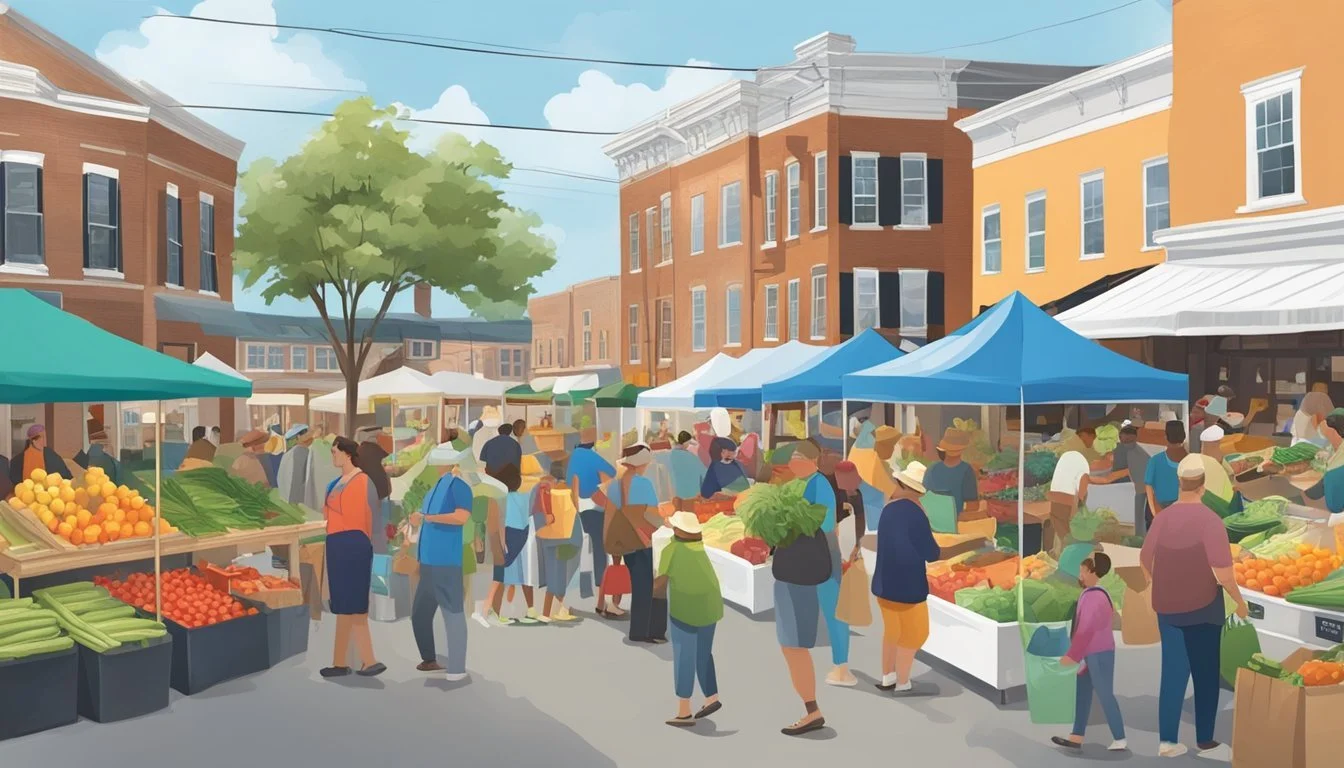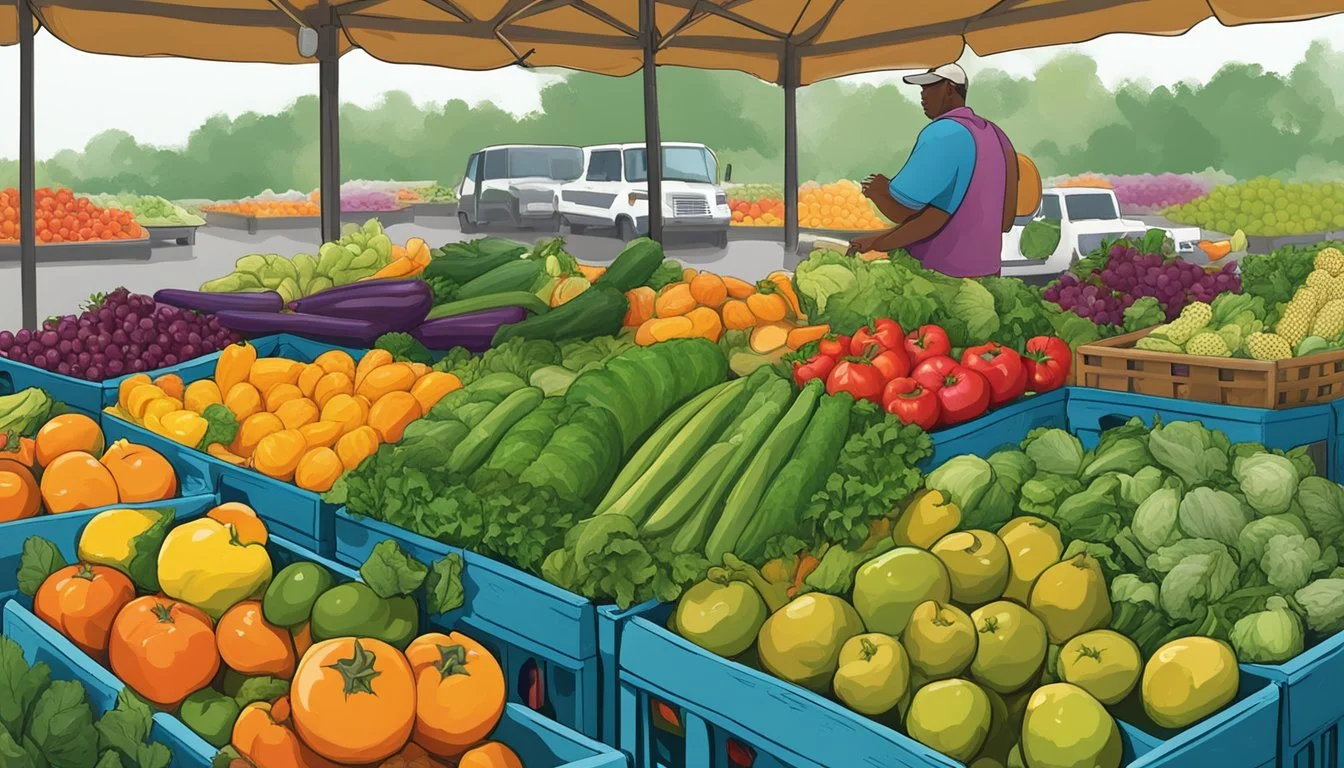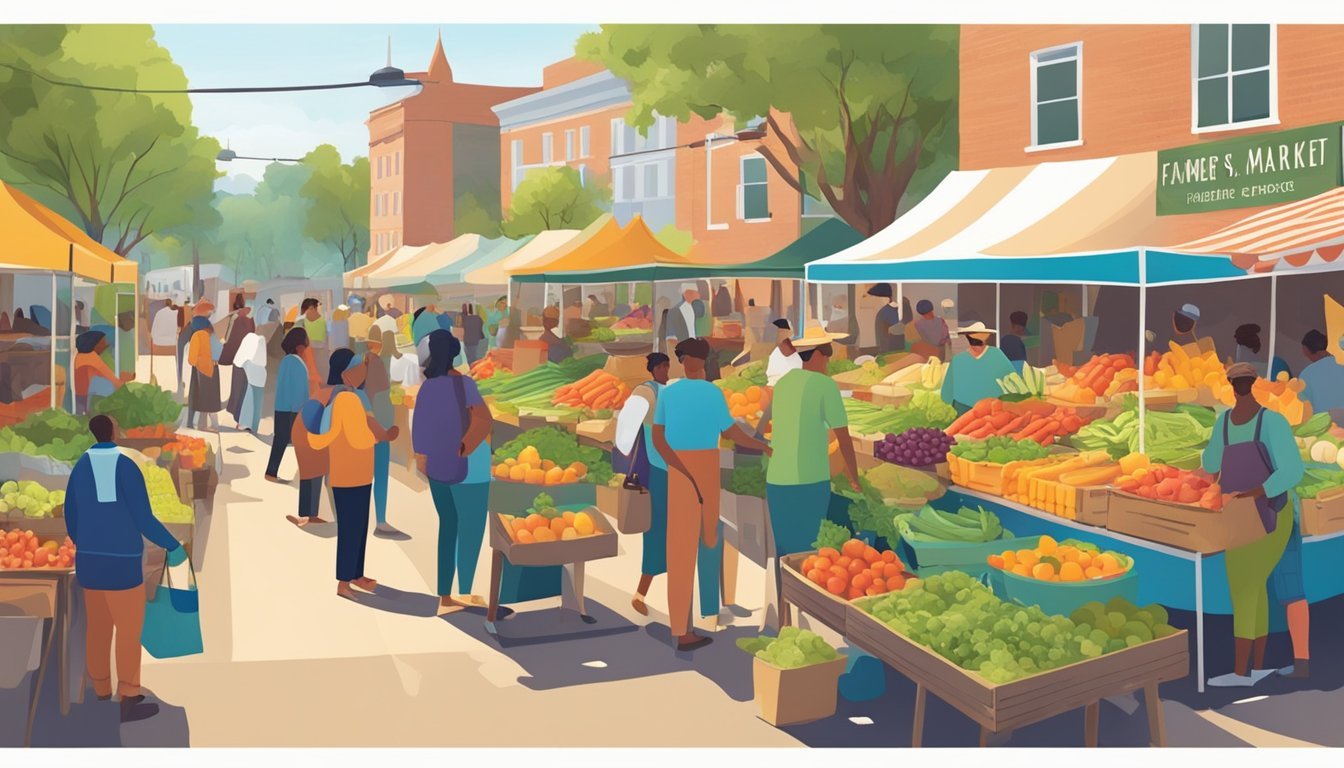Community Supported Agriculture (CSA) in Wilmington, NC
A Guide to Local Farm Partnerships
Community Supported Agriculture (CSA) is a sustainable farm-to-table system that is gaining momentum in Wilmington, North Carolina. This innovative approach allows residents to have direct access to high-quality, fresh produce while supporting local farmers and the regional economy. In Wilmington and its surrounding areas, a variety of CSA programs are available, offering shares of the season's harvest to customers. Participants can enjoy a diverse range of locally grown fruits, vegetables, meats, eggs, and other farm products.
The CSA model in Wilmington fosters a strong connection between farmers and consumers. Individuals who join a CSA become integral stakeholders in the agricultural cycle, sharing both the bounties and the risks inherent in farming. This direct relationship not only enhances the agricultural knowledge of the community but also contributes to a more resilient local food system.
Local farms in the Wilmington region have tailored their CSA programs to meet the varying needs of their members. Some offer weekly or monthly subscription boxes, while others provide flexibility with customizable share options. These programs have proven to be mutually beneficial, as they provide farmers with a more predictable income stream and offer consumers a steady supply of fresh, locally sourced products throughout the growing season.
Understanding Community Supported Agriculture
Community Supported Agriculture (CSA) in Wilmington, NC offers a unique opportunity for consumers to buy directly from farmers, sharing in the bounty and risks of agricultural production.
History and Principles of CSA
Community Supported Agriculture originated in the 1960s in Germany, Switzerland, and Japan as a response to concerns about food safety and the urbanization of agricultural land. It reached the United States in the 1980s and has since grown in popularity. The core principles of CSA involve shared risk and mutual benefits: consumers (members) pay farmers in advance for a season's worth of agricultural products. This model provides farmers with immediate working capital and reduces waste by growing food already sold. In Wilmington, CSA members may receive weekly or monthly shares of the harvest, fostering a closer connection to their food source.
Types of CSA Models
CSA models vary and are tailored to meet the needs of a particular community. In Wilmington, these include:
Producer-Initiated CSAs: Initiated by farmers who plan, manage, and operate the CSA.
Member-Initiated CSAs: Created by consumers who approach farmers to provide produce, with administrative duties often shared.
Multiple-Producer CSAs: Involves several farmers contributing to the CSA shares, providing greater variety to consumers.
Organization-Initiated CSAs: Non-profit or cooperative organizations initiate the CSA to support local agriculture.
Each model presents its framework of operation, always keeping the foundation of connecting consumers with their local food systems.
Benefits of Joining a CSA
Consumers in Wilmington who join a CSA enjoy numerous benefits:
Access to fresh, locally-grown produce often harvested the same day it's received.
Exposure to new vegetables and innovative ways of cooking.
Chance to visit the farm and talk to farmers, deepening the understanding of where food comes from.
Economic benefits for farmers, as they receive payment early in the season, which can help with the farm's cash flow and planning.
By participating in a CSA, consumers are not just buying food; they are making a conscious decision to support their local farmers and economy, while sharing the risk of farming with their community.
Local CSA Farms in Wilmington
Wilmington, North Carolina, has a thriving Community Supported Agriculture (CSA) network, with local farms offering a variety of membership options that allow members to receive fresh, seasonal produce and farm products. Among them is the Tidal Creek Co-op Farm, which presents an excellent archetype of a CSA in the area.
Tidal Creek Co-op Farm
Tidal Creek Co-op Farm stands out as a prominent CSA provider in Wilmington, NC, known for its commitment to sustainable farming practices. The co-op collaborates with nearby farms, ensuring that they provide a diverse array of farm-fresh products to their members.
Membership and Share Options
Membership Fee: Becoming part of a CSA usually involves paying an upfront membership fee, which supports the farm's operations. In return, members are guaranteed a share in the harvest.
Shares: These typically consist of a weekly or monthly box containing a variety of vegetables, fruits, and other farm products like eggs and cheeses. Some CSAs may also offer different sizes or types of shares based on individual or family needs.
CSA Directory: For those interested in exploring other local CSA options in Wilmington, the area boasts a supportive CSA directory. This resource is particularly valuable for connecting consumers with family farms where they can subscribe to their seasonal offerings.
Seasonal Availability and Produce
Community Supported Agriculture in Wilmington, NC, provides a bounty of fresh produce that varies with the seasons. Subscribers to CSA boxes receive a regular assortment of vegetables and fruits that are harvested at their peak, ensuring the freshest and most flavorful experience.
Typical Crop Calendar
Spring:
Vegetables: Radishes, lettuce, and broccoli start the season.
Fruit: Limited availability, with some early varieties of strawberries appearing late in the season.
Summer:
Vegetables: A diverse array of produce including tomatoes, squash, and potatoes.
Fruit: Berries become more prevalent, followed by early stone fruits.
Fall:
Vegetables: Expect hearty staples like squash as well as a second planting of cool-weather crops like broccoli.
Fruit: Apples and late-season peaches often round out the fruit options.
Winter:
Vegetables: Greens can persist through mild winters, and root vegetables like turnips may be available.
Fruit: Citrus fruits and winter squashes are common.
The exact timing and availability of produce may vary due to factors like weather conditions and specific farm practices. However, these general patterns reflect Wilmington's typical annual harvest cycle.
Joining a CSA in Wilmington
Community Supported Agriculture (CSA) in Wilmington offers residents a way to purchase fresh, local produce directly from farmers. By joining a CSA, members support local agriculture, receive weekly or monthly shares of farm products, and contribute to a sustainable food system.
How to Find and Select a CSA
Residents can begin their search for a CSA by visiting local farmers' markets or checking online directories of CSAs in the Wilmington area. When selecting a CSA, individuals should consider the types of products offered, the location of pickup sites, and the farm's growing practices. Questions about the farm's operational methods, the variety of produce, and the length of the CSA season are also pertinent.
Understanding CSA Membership
CSA membership involves entering into a mutual commitment with a local farm. Members pay in advance for a share of the season's harvest and, in turn, receive regular distributions of farm products. Membership options might include different levels of ownership—such as full shares and half shares—and often require members to sign an agreement outlining the terms of the subscription.
Share Sizes and Payment Plans
Share Sizes:
Full Share: Sufficient for a family, often includes a variety of vegetables, fruits, and other products.
Half Share: A smaller selection intended for individuals or small households.
Payment Plans:
Lump Sum: Paying the whole share price at the start of the season.
Installments: Payment in several installments over the season.
It's essential to inquire about the share price and available payment plans. The price may range between $400-$700 annually on average, with variances depending on the CSA. Some farms may also offer payment assistance or sliding scale fees to accommodate different budgets. Subscribers should carefully review share-size options and payment schedules before committing.
CSA Operations and Management
Community Supported Agriculture in Wilmington, NC involves a symbiosis between local farms and community members, underpinned by careful planning and cooperative practices. From ensuring diverse farm produce to employing effective marketing strategies and managing member roles, a CSA's success depends largely on the structured responsibilities and plans set forth by the farmers.
Farmers' Responsibilities
Farmers take the helm in CSA operations, managing everything from sowing to harvesting. They ensure that a steady supply of fresh produce meets the members' needs. It is their duty to maintain crop quality and manage the day-to-day activities on the farm, which include planting, tending, and harvesting crops in alignment with the CSA's schedule.
CSA Marketing Strategies
Effective marketing strategies are paramount for the recruitment and retention of CSA members. Farmers may utilize CSA Innovation Networks and local farmers' markets to promote their CSA shares. Digital marketing, including social media and email newsletters, is also leveraged to communicate with current and prospective members about available produce and subscription details.
The Role of Member Volunteers
Member volunteers can significantly reduce labor costs and enhance community engagement. Tasks typically include assisting with packaging CSA boxes, helping with farm events, or even participating in planting and harvesting. The inclusion of members in farm operations not only fosters a sense of ownership but also strengthens the farm-to-consumer relationship.
Business and Budget Planning
A robust business plan and budget are vital for a farm's financial health. Farmers must account for costs such as seeds, equipment, labor, and land lease or mortgage. They also plan for the number of shares they can support and price them accordingly to ensure the farm's economic sustainability and the ability to invest in continuous improvements.
By adhering to these structured plans and responsibilities, CSA farms in Wilmington, NC work towards creating a sustainable local food system that supports both farmers and community members alike.
Consumer Experience and Engagement
Engaging with a Community-Supported Agriculture (CSA) in Wilmington, NC, offers consumers a unique experience that extends beyond just receiving fresh produce. It involves logistical coordination, community involvement, and consistent communication between the farm and its members.
Delivery and Pickup Logistics
Pickup Locations: CSA members conveniently collect their shares at designated pickup points across the region on scheduled days. These locations are strategically selected for ease of access and efficient distribution.
Delivery: Some CSAs provide a delivery service directly to consumers' doors, simplifying the process for those who cannot commute to pickup locations. Precise delivery schedules are communicated in advance to ensure consumers are available to receive their products.
Community Events and Education
Community Engagement: Farmers typically organize events such as farm tours, cooking classes, and harvest festivals, offering CSA members a chance to deepen their understanding of sustainable agriculture and local food systems.
Educational Outreach: Newsletters and emails provide valuable content on topics such as seasonal recipes, the story behind each week's box contents, and tips for storing and preparing the produce, strengthening the relationship between consumers and their food.
Communication with CSA Members
Email Correspondence: Regular emails keep CSA consumers informed about the share availability, upcoming community events, and any changes in the delivery or pickup schedule.
Newsletters: A periodic newsletter is an effective tool for maintaining an ongoing dialogue, providing insights into the farming process and life on the farm as well as spotlighting the journey from farm to table.
The consistent and clear exchange of information ensures a robust connection between consumers and their local CSA, fostering an invested community around sustainable and local agriculture.
CSA Trends and Innovations
Community-Supported Agriculture (CSA) in Wilmington, North Carolina, is witnessing a growing emphasis on technology and collaborative efforts, significantly shaping the future of local food economies.
Technological Advancements in CSA
In Wilmington, technological tools are revolutionizing the CSA scene. Farmers now leverage data analytics to forecast yields and consumer preferences, ensuring their crop selection closely aligns with market demands. The integration of Application Programming Interfaces (APIs) has opened doors for CSAs to effectively manage subscriptions and streamline their operations. These tools not only optimize internal processes but also enhance the customer experience by simplifying signup procedures and offering real-time updates on produce availability.
Networking and Partnerships
The CSA model thrives on strong community relationships, and Wilmington is no exception. Local CSAs actively participate in networks and associations dedicated to sustainable agriculture, such as the CSA Innovation Network. This collaboration fosters a sharing of best practices and innovations within the community. Surveys are often conducted to gather feedback and suggestions from members, which are crucial for CSA providers to adapt and innovate. The shared commitment to the CSA movement ensures continuous innovation, as members and farmers alike seek ways to deepen their connection with one another and with the land that feeds them.
Support and Resources
Community Supported Agriculture (CSA) in Wilmington, North Carolina, offers ample support and resources for both consumers and farmers. These include extensive networks and educational materials aimed at fostering locally-grown food initiatives and strengthening the bond between local food directories and growers.
Local and National CSA Resources
Local Resources:
NC State Extension: It provides detailed guides and toolkits for both seasoned and aspiring farmers interested in starting CSAs. Resources include the development of business plans, setting share prices, and techniques for recruiting members.
Chatham County Center: Part of the North Carolina Cooperative Extension, it emphasizes supporting small farms' sustainable agriculture practices through various resources and support systems tailored to their unique needs.
National Resources:
Local Harvest: This national network connects consumers to local farms and CSAs, acting as a comprehensive local food directory.
Multifarm CSA Handbook: Published by the Sustainable Agriculture Research & Education (SARE), this handbook guides cooperative marketing strategies and can be a vital resource for CSA farmers looking for a collaborative approach.
Educational Materials and Workshops
Workshops and Learning Opportunities:
CSAs in Wilmington benefit from educational workshops hosted by the NC State Extension. These sessions cover a broad spectrum of topics from sustainable farming practices to marketing and CSA management.
Additionally, the Chatham County Center has historically been proactive in creating educational opportunities that cater to small farmers, enabling them to acquire knowledge that is crucial for the sustainability and growth of their operations.
By utilizing a comprehensive array of resources and educational materials, those involved in Community Supported Agriculture in Wilmington can enhance their expertise and ensure the success of their local food initiatives.
Frequently Asked Questions
What is Community Supported Agriculture (CSA)?
Community Supported Agriculture (CSA) is a model where consumers subscribe to receive regular deliveries of locally farmed produce, meat, and other farm products directly from the farmers.
How does one join a CSA in Wilmington, NC?
To join a CSA, interested individuals can sign up directly with a local farm offering CSA subscriptions. They will typically pay a fee upfront for a share of the upcoming harvest.
What can be expected in a CSA box?
A CSA box may contain a variety of products such as:
Fresh flowers
Meats
Eggs
How often are CSA boxes delivered?
Delivery can vary, but boxes are commonly offered on a weekly or monthly basis.
Are there different types of CSA subscriptions available?
Yes, some Wilmington farms offer options such as:
Meat/Egg CSA
Vegetable CSA
Extended Season Share
Specialty shares (e.g., mushroom, fruit, flower)
Can one customize their CSA box?
This depends on the farm. Some farms offer customizable boxes, while others provide a standard assortment.
What are the payment options for CSA subscriptions?
Payment is generally requested at the beginning of the subscription period either in full or in installment. Some farms may also offer a waitlist option.
Tip Description Research local CSA options Different farms offer unique selections and programs. Understand seasonal offerings CSA contents are season-dependent. Inquire about pickup or delivery options Some farms may not offer home delivery. Communicate dietary restrictions or preferences Farms may or may not be able to cater to these.






